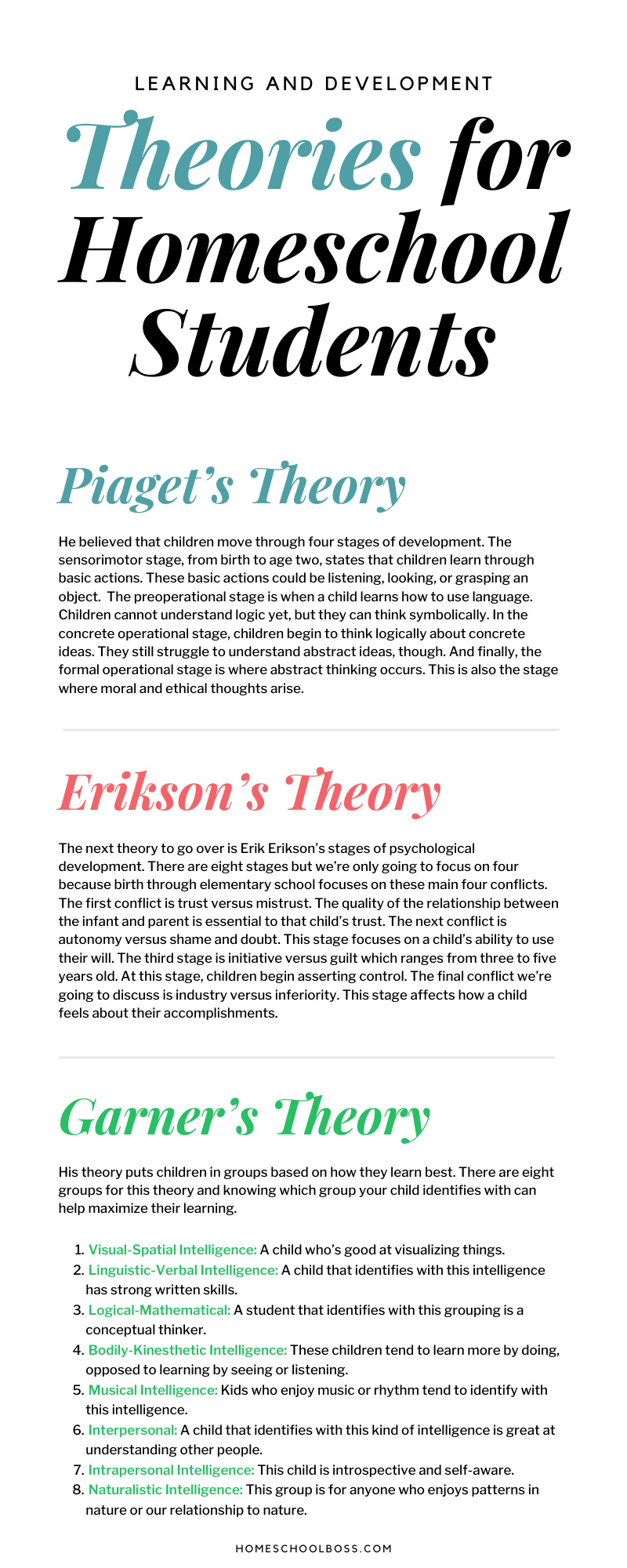
One of the most important parts of education is understanding the various learning and development theories. In school, education majors go through semesters of classes that focus on these theories. Although a formal teaching certification isn’t necessary to homeschool children, it’s still important to understand these theories. We put together a guide with learning and development theories for homeschool students, so keep reading if you’re looking to maximize your child’s education.
Piaget’s Theory
It’s beneficial to know the various learning and development theories for homeschool students because it helps to better understand your child. If you choose to homeschool your child, it’s essential that you understand these theories, starting with Jean Piaget’s theory of cognitive development. He believed that children move through four stages of development. The first stage is the sensorimotor stage. He believes this stage ranges from birth to two years old. The next stage is the preoperational stage which ranges from ages two to seven years old. The third stage is the concrete operational stage which ranges from ages seven to 11 years old. The fourth and final stage is the formal operational stage, ranging from ages 12 and up.
The sensorimotor stage, from birth to age two, states that children learn through basic actions. These basic actions could be listening, looking, or grasping an object. This theory also suggests that children learn that things exist, even though they can’t see them. This is known as object permanence. Children also learn that actions cause things to occur.
The preoperational stage is when a child learns how to use language. Children cannot understand logic yet, but they can think symbolically. Children begin to learn how words and objects are connected, too. At this stage, children cannot see things from other people’s perspectives.
In the concrete operational stage, children begin to think logically about concrete ideas. They still struggle to understand abstract ideas, though. This is also the stage where children begin to understand the concept of conversion. As you can see, this is a stage where a lot of development occurs. At this stage, their thinking is much more organized and logical.
And finally, the formal operational stage is where abstract thinking occurs. Children can also begin understanding hypothetical situations. This is also the stage where moral and ethical thoughts arise. In general, the child’s thought process becomes more complex. Knowing these stages can help understand where your child should be, in a more general sense. This theory gives parents a better understanding of how a child develops over time.
Erikson’s Theory
The next theory to go over is Erik Erikson’s stages of psychological development. There are eight stages but we’re only going to focus on four because birth through elementary school focuses on these main four conflicts.
The first conflict is trust versus mistrust. This stage is from birth to 18 months. The quality of the relationship between the infant and parent is essential to that child’s trust. Feeding is the important event in this stage that often shapes a child’s trust and outlook of the world. If feeding isn’t finished or is inconsistent, this can lead to mistrust and anxiety in a child.
The next conflict is autonomy versus shame and doubt. This stage is from 18 months to three years old. This stage focuses on a child’s ability to use their will. The important event in this stage is toilet training. If a child is shamed for having an accident, they’re more likely to doubt their abilities and feel shameful as a result. If a child is successful in toilet training, they’re more likely to feel autonomous.
The third stage is initiative versus guilt which ranges from three to five years old. At this stage, children begin asserting control. The important event at this stage is exploration. Success in this stage leads to feeling confident and capable. Children who are successful at this stage feel confident enough to lead others and take initiative. Children that don’t see success at this stage of exploration are left with guilt and feels of self-doubt.
The final conflict we’re going to discuss is industry versus inferiority. This stage is from ages six to 11 years old. An important event in this stage is school. This stage affects how a child feels about their accomplishments. If a child is encouraged for their accomplishments, they’ll feel competent and proud. If they don’t receive encouragement, they might grow up to doubt their abilities. Knowing these stages ensures that you communicate with your child in a way that’s meaningful and encouraging.
Garner’s Theory
The final theory that’s extremely important to know is Howard Garner’s theory of multiple intelligence. His theory puts children in groups based on how they learn best. There are eight groups for this theory and knowing which group your child identifies with can help maximize their learning. Visual-spatial intelligence is for a child who’s good at visualizing things. The next grouping is linguistic-verbal intelligence. A child that identifies with this intelligence has strong written skills.
Another intelligence is logical-mathematical; a student that identifies with this grouping is a conceptual thinker. The next grouping is the bodily-kinesthetic intelligence. These children tend to learn more by doing, opposed to learning by seeing or listening. Another intelligence is musical intelligence; kids who enjoy music or rhythm tend to identify with this intelligence.
Interpersonal is another intelligence that many children identify with. A child that identifies with this kind of intelligence is great at understanding other people. This child is typically more mature and empathetic. The next intelligence is intrapersonal intelligence. This child is introspective and self-aware. The final group is the naturalistic intelligence; this is for anyone who enjoys patterns in nature or our relationship to nature. This is a newer addition to Garner’s theory. Understanding this theory helps maximize your child’s learning by identifying how they best absorb information.
At Homeschool Boss, we strive to make homeschooling a stress-free and successful process. Homeschool standardized testing can be overwhelming, so we encourage you to visit our website. We offer NWEA’s MAP Growth tests so that parents don’t have to stress about what their child is ready to learn. Feel free to give us a call if you have any questions or if you’d like a book a test. We’d be more than happy to assist you!
